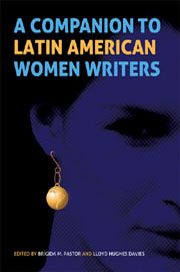Book contents
- Frontmatter
- Contents
- Introduction: The Feminine Voice in Latin American Literature
- 1 Sor Juana Inés de la Cruz (1648/51?–1695)
- 2 Gertrudis Gómez de Avellaneda (1814–1873)
- 3 Gabriela Mistral (1889–1957)
- 4 Alfonsina Storni (1892–1938)
- 5 Silvina Ocampo (1903–1993)
- 6 Clarice Lispector (1920–1977)
- 7 Rosario Castellanos (1925–1974)
- 8 Elena Poniatowska (1933– )
- 9 Alejandra Pizarnik (1936–1972)
- 10 Luisa Valenzuela (1938– )
- 11 Isabel Allende (1942– )
- 12 Rosario Ferré (1938– )
- 13 Laura Esquivel (1950– )
- 14 Laura Restrepo (1950– )
- Conclusion
- Bibliography
- Index
1 - Sor Juana Inés de la Cruz (1648/51?–1695)
Published online by Cambridge University Press: 05 February 2013
- Frontmatter
- Contents
- Introduction: The Feminine Voice in Latin American Literature
- 1 Sor Juana Inés de la Cruz (1648/51?–1695)
- 2 Gertrudis Gómez de Avellaneda (1814–1873)
- 3 Gabriela Mistral (1889–1957)
- 4 Alfonsina Storni (1892–1938)
- 5 Silvina Ocampo (1903–1993)
- 6 Clarice Lispector (1920–1977)
- 7 Rosario Castellanos (1925–1974)
- 8 Elena Poniatowska (1933– )
- 9 Alejandra Pizarnik (1936–1972)
- 10 Luisa Valenzuela (1938– )
- 11 Isabel Allende (1942– )
- 12 Rosario Ferré (1938– )
- 13 Laura Esquivel (1950– )
- 14 Laura Restrepo (1950– )
- Conclusion
- Bibliography
- Index
Summary
Juana Ramírez de Asbaje, the illegitimate daughter of an illiterate criolla, was born on a small hacienda in central Mexico. Her rise to become the premier poet of the colonial Americas – all of them – is a compelling story. We know neither her exact birth date, nor much about her father, Pedro Manuel de Asbaje, a Basque captain who had three children with Isabel Ramírez, then disappeared when Juana, the second of three daughters, was about five or six. Isabel subsequently produced three more children with another Spaniard. Illegitimate children were common in colonial Mexican society, among both white and criolla families, but their social status was definitely impaired by birth out of wedlock (for further discussion, see Lavrin, 1994: 154–58). Isabel, strong and active, was a good manager of her property. Juana was close to her maternal grandfather, in whose library she spent much of her youth before being sent to Mexico City to live with Isabel's sister and her husband, who were wealthy and socially prominent. Juana had learned to read when she was three, and had written her first poem when she was eight. She was a pretty, vivacious and prodigiously intelligent girl, who was presented at the viceregal court around 1664 and so captured the fancy of the vicereine, Leonor Carreto, that she was asked to become her lady-in-waiting, an honour usually reserved for the daughters of the city's first families.
So, while still in her teens Juana was already moving in Mexico's highest social circles.
- Type
- Chapter
- Information
- A Companion to Latin American Women Writers , pp. 23 - 36Publisher: Boydell & BrewerPrint publication year: 2012



